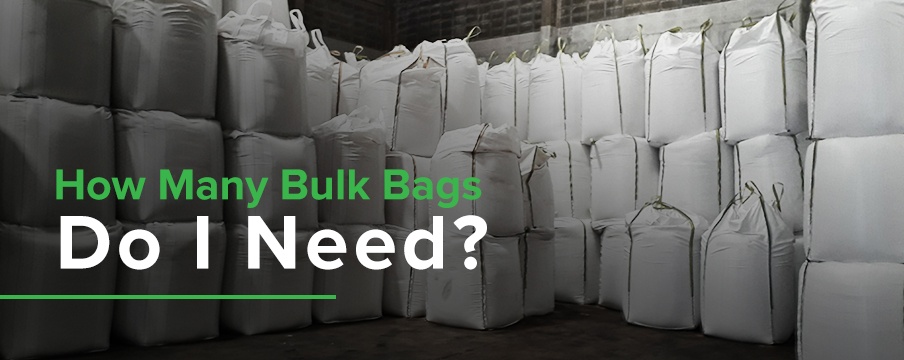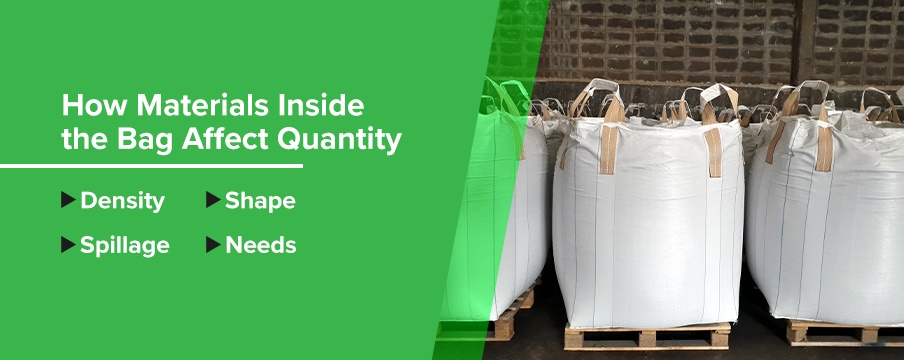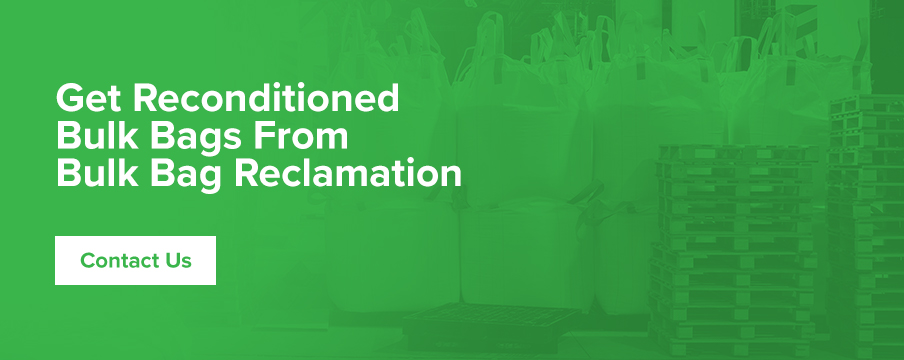How Many Bulk Bags Do I Need?
Bulk bags are a safe, efficient way to store and transport items in all industries, including agricultural, food processing, construction and chemical projects. They are lightweight without sacrificing durability, which makes them easy to handle and cost-effective.
If you’ve decided bulk bags are the best option for your farm or business, here’s what you need to know to decide how many bulk bags you need.
How the Type of Bulk Bag Affects the Quantity
Bulk bags are available in various capacities and dimensions, including total volume and height. The larger a bag is, the more space there is to contain products safely. Some bags also accommodate natural bulging, creating more space inside.
Different bag types come in varying sizes:
- Baffle: Baffle bulk bags have a sturdy interior panel that keeps shape and avoids bulging, no matter what you store inside. Bulk Bag Reclamation has baffle bags available in 39x47x74-inch, 35x41x60-inch and 42x42x42-inch variations, each measured length by width by height.
- Duffle top: Duffle top bulk bags have a special top you can easily open or close. Most accommodate a level of bulging. Choose from 35x35x38-inch, 35x35x58-inch, 35x35x50-inch and 42x42x42-inch options.
- Spout top: Use a spout top bulk bag for easy filling and emptying, with your choice between a 36x36x36-inch, 40x48x60-inch, 35x41x80-inch, 38x38x65-inch, 34x41x63-inch, 36x36x60-inch or 38x38x34-inch bag size.
- Open top: An open top bulk bag is suitable for manual filling requirements and is available in a 35x41x58-inch option.
How Materials Inside the Bag Affect Quantity
When choosing and using your bulk bags, you must be mindful of the safe working load, or SWL. A bulk bag’s SWL refers to how many pounds that bag can safely handle without bag breakage, personal injury or product damage.
The materials you store in your bulk bag impact how many bulk bags you need. Some products take up more volume or weigh more than others. For example, a bulk bag can hold more sand or seeds than stone and rock before reaching its maximum weight capacity. That means you would need more bags to store one load of stone than you would one equal-sized load of seeds.
Keep these considerations in mind as you’re choosing your bulk bags:
- Density: High-density items — like bulky construction supplies or gravel — take up more room than an equal amount of a lower-density item, like paper or small food products. Consider underfilling bags that contain high-density items to ensure safe transportation. Low-density items typically transport well at their full capacity.
- Spillage: Items that may spill — like ash, soil, sand or grains — can benefit from a little extra space at the top of the bag so they won’t leak out in the event of an accident.
- Shape: If you’re storing something unusually shaped or with varying sizes, you will likely need more bags than you would if you’re storing more uniform items.
- Needs: Consider any special needs your product has, like if it’s prone to breakage and needs space for movement or if you need to invest in additional bags for extra protection.
Reconditioned Bulk Bags
Reconditioned bulk bags are bulk bags that have been reclaimed from dry-flow human or animal consumption products and repurposed for continued use. Every reconditioned bulk bag from Bulk Bag Reclamation is free of toxic chemicals or substances and has undergone extensive inspection to meet strict industry and safety standards. Compared to brand-new or single-use receptacles, reconditioned bulk bags are more affordable and eco-friendly while retaining the same ease-of-use and reliability.
Affordable
Reconditioned bulk bags are more affordable than brand new ones, letting you buy more for less and get the most out of your financial investment. The more bulk bags you have on hand for your supply, the less likely you are to overfill bags or exceed a bag’s SWL, fostering a safer, more efficient workflow and minimizing the chance for bag breakage and replacement.
Effective
Reconditioned bulk bags are just as effective at storing, transporting and protecting materials around your farm or business as new bags.
Like new ones, reconditioned bulk bags are:
- Suitable for all types of applications, including bulky and heavy products.
- Lightweight and easy to manage.
- Constructed out of strong, woven materials that resist water and prevent spillage.
- Will not shrink, warp, melt or deteriorate in direct sunlight.
- Resilient to most environmental conditions while protecting the items inside.
- Available in multiple types, sizes and capacities for various applications.
When you invest in reconditioned bulk bags, you get all of these benefits for a small financial investment, freeing up budget to spend elsewhere on your operations.
Eco-Friendly
Reconditioned bulk bags are an environmentally friendly alternative to brand new bulk bags. Each bag is constructed out of woven polypropylene plastic and occasionally PVC. Unfortunately, only 1% — sometimes less — of the country’s polypropylene gets recycled. The rest sits in landfills, where they take up space and pose a threat to surrounding environments and wildlife habitats. By using reconditioned bags, you’re doing your part to keep harmful plastics away from the environment and prolonging their lifespan.
Using reconditioned bags can help you achieve business-wide goals as well, like a stronger focus on green packaging or minimally invasive practices. You can also reuse and recycle your reconditioned bulk bags, or even potentially resell them, once you’re finished storing or moving products:
- Reuse: Reuse your bulk bags for future product loads or repurpose them around your facility for a lightweight, watertight storage option.
- Recycle: When you’re finished with your bags, simply take them to a nearby recycling facility, where they will be processed and reclaimed for use in other items.
- Resell: Pending eligibility, Bulk Bag Reclamation may offer to purchase clean, reusable bags you no longer need. The bags must be in good condition without a history of hazardous chemicals or toxic contents. We will recycle bulk bags that are not suitable for resell. Submit photos and information online to learn more!
Get Reconditioned Bulk Bags From Bulk Bag Reclamation
The easiest way to determine how many bulk bags you need is by considering:
- The type of item you plan to store, whether it’s considered a high-density or low-density product and any special considerations.
- The best bulk bag size and type of bag — baffle, duffle top, spout top or open top — for your chosen application.
- The total bulk bag volume capacity and SWL.
- How much material you can fit into a single bag while staying at or below the SWL.
Once you know this information, you can add up the estimated number of bags for your project or contact a Bulk Bag Reclamation representative for assistance. Tell us more about your products and storage or transportation goals, and we’ll help you choose the best type, size and quantity for your application. Bulk Bag Reclamation offers an expansive inventory of reconditioned bulk bags available in various styles and sizes. Contact us to learn more or request a quote today!



